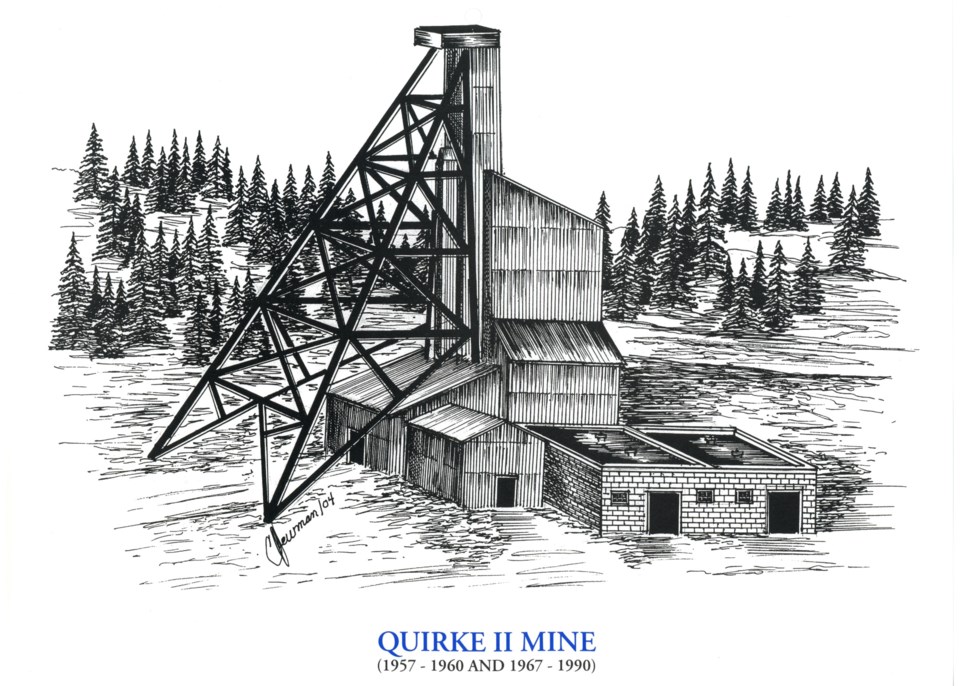SUDBURY - For anyone working in Ontario today, it seems a given that workers are automatically protected by law from situations where they might be put in danger or get hurt or sick in the workplace.
It was not always like that.
It was 50 years ago today — on Sept. 10, 1974 — that former Ontario Premier Bill Davis and Lieutenant Governor Pauline Mills McGibbon initiated an order-in-council to investigate matters related to health and safety in Ontario's mining industry.
That set the wheels in motion for a years-long evolution that would see the formal creation of Ontario's Occupational Health and Safety Act.
This was the creation of Ontario's landmark legislation that forever changed the rights of workers in this province to stand up and refuse unsafe working conditions anywhere and anytime.
While it began half a century ago it was not all that long ago for working people and retirees especially in the mining industry in Northern Ontario who remember a time when workers' rights were on rocky ground.
Wildcat
The year 1974 was a tumultuous time for workers in Northern Ontario. Miners in Elliot Lake had staged a wildcat walkout (April 18, 1974) to protest poor working conditions at the Denison and Rio Algom uranium mines in that town.
Their concern was that dust in the mines was creating conditions so bad that some miners said they were left gasping for fresh air. Some miners were also seeking additional pay to offset the poor working conditions, according to news reports of the day.
More than 600 miners (some estimates said close to 1,000) walked off the job and set up picket lines at the mine gates in a strike that would last for more than two weeks.

In the Ontario Legislature a week later, Sudbury East MPP Elie Martel asked Natural Resources Minister Leo Bernier, the minister in charge of mines, if he would use his influence to get the uranium mining companies to negotiate with the striking miners, and hopefully resolve their concerns about silicosis and too much dust.
Bernier said he admired Martel for his concern, but said the walkout was an illegal action that might better be handled by the minister of labour.
Some days later, Bernier told the legislature that more than 2,000 dust and radioactivity tests had been carried out in the Elliot Lake uranium mines by the company officials the previous year.
Ontario NDP leader Stephen Lewis questioned the validity of the testing and said company workers should not be conducting tests that should be done by government inspectors. He said Ontario "should not get the companies to do its dirty work.”
Martel told the legislature that he had been told by miners that testing was often done right in front of a fresh air ventilation fan or at times when the drifts had been sprayed with water to suppress dust underground.
Also in the legislature that month, Bernier said he had been told the wildcat strikers in Elliot Lake were insistent on getting a pay raise.
"It does appear there are those who have attempted to use the working conditions as a reason for the work stoppage, when in fact it appears to have more to do with the cost of living increase," Bernier said.
Lewis was upset with that comment. "Oh, come on." Lewis said he couldn't believe Bernier would make such a statement.
The exchange between the two politicians is worth a short read:
Bernier: I understand that at the present time the union is refusing to let the workers go back to work until the company has made an unqualified commitment on the wage issue.
Lewis: The union is refusing to let them go back? They don’t want to go back.
Bernier: On the other hand, the company appears to be waiting for the men to go back to work.
Nickel Belt MPP Floyd Laughren interjected: That is so much crap!
The job action eventually convinced the government to launch a formal inquiry that year. Fifty years later, Sudbury MPP Jamie West is Ontario's official opposition labour critic for the NDP.
He said he was proud that Ontario's health and safety legislation had its roots in Northern Ontario.
"And so the Elliot Lake strike, which led to the Ham Commission, which led to the Occupational Health and Safety Act, as we know it is sort of the foundation of Ontario's Health and Safety Act," said West during a Labour Day interview.
Royal Commission
Ontario's Ham Commission (properly Royal Commission on the Health and Safety of Workers in Mines, which named for the man who led the commission, Prof. James Milton Ham, an engineer and academic) was ordered by Premier Bill Davis in the late summer of 1974 to carry out a serious probe into the unsatisfactory state of working conditions that existed in many Ontario mines at the time.
The Ham Commission travelled throughout Northern Ontario to hold hearings in mining towns and to gather input from unions, mining companies and ordinary miners.
The hearings were held in Elliot Lake, Red Lake, Thunder Bay, Sault Ste Marie, Sudbury, Timmins, and Kirkland Lake, and also in Toronto and Ottawa.
The commission also visited mines, union offices and government agencies responsible for safety.
The result was the Report of the Royal Commission on the Health and Safety of Workers in Mines, tabled on June 30, 1976.
The document had 117 recommendations outlining the need for a whole new set of laws to protect workers and give them rights to speak up about the safety of working conditions, to participate in solving workplace safety problems and to see the creation of the internal responsibility system.
The document also identified the following key health and safety concerns: silicosis and dust, lung cancer and ionizing radiation in the uranium mines, accidents and injuries, and other environmental hazards, biological agents, chemical agents, heat/temperature and noise.
Labour critic West said while the report was a landmark document, it is something that modern day workers and employers need to look back on. West said he believes that not enough people understand the history and context of health and safety legislation and how to apply it today.
"I think there's a massive misunderstanding for workers and employers. I wish there was more education in high school, because people start working in high school, and that basic understanding of health and safety and the idea of a lot of things in the labour movement are seen as adversarial, right? You go to contract negotiations and the union wants something and the company wants something else," he said.
West, who has a formal background in mining health and safety, said workers and employers need to work better together to reach solutions.
He said employers and management often reach a plateau of agreeing on the importance of worker safety, but do not know how to move forward.
West said it is up to ministry of labour inspectors to move things forward through more enforcement, but said that it is not happening enough.
West said he would like to see the labour ministry take a more active role in promoting workplace health and safety.
In the preface to his landmark report presented to the Ontario government, Prof. Ham ended with the following statement:
“Frederic LePlay, a distinguished French sociologist and inspector general of the mines of France in the late nineteenth century, said that the most important thing to come out of mines is the miner. I share his conviction today.”
Len Gillis covers health care and mining for Sudbury.com.





